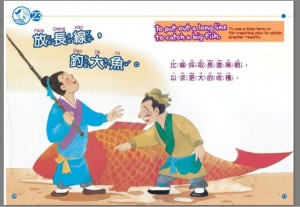Proverbs: Six of One, Half Dozen of the Other (諺語) Posted by Stephen on Aug 7, 2011 in Culture, Vocabulary
 Proverbs or 諺語 (yànyŭ) provide invaluable insight into understanding both a language and a culture. They are a window into the very history and nature of language. Our euphemisms, insults, lessons and catch-phrases are all part of the immense dialogues that have progressed and lasted for decades, centuries, (and in Chinese’s case) millennium. Count the number of times a proverb, idiom or axiom is brought up in your day to day. Tons of times, right? It’s just part of who we are as people. We like to ad variety, wisdom and spice to what we say.
Proverbs or 諺語 (yànyŭ) provide invaluable insight into understanding both a language and a culture. They are a window into the very history and nature of language. Our euphemisms, insults, lessons and catch-phrases are all part of the immense dialogues that have progressed and lasted for decades, centuries, (and in Chinese’s case) millennium. Count the number of times a proverb, idiom or axiom is brought up in your day to day. Tons of times, right? It’s just part of who we are as people. We like to ad variety, wisdom and spice to what we say.
Today I was talking to a native Taiwanese person, and reflecting upon the intense heat, said: “It’s hotter than Hades, today”, to which I received a blank stare. “Hades? What? What means that?” he responded. “今天的天气很热“ I quickly responded in Chinese (Today’s weather is hot). “Oh oh”, he smiled, finally getting it. “天气让你觉得着急的” (zháojí de) or “The weather has you all hot and bothered”. Was that translation right, or was he making a Chinglish proverb? I thought it over, and then harked back on all the times I tried to turn a English proverb into a Chinese one…almost always without success. Why? Because our lexicons are vastly different, and as a result, the way we “turn” phrases reflects that discrepancy.
Unfortunately, most proverbs don’t directly translate from Chinese to English and vice versa, although the logic behind them makes sense once you understand the background. The english proverb, “Kill two birds with one stone” does have an exact Chinese equivalent: 一石二鸟 (yìshí’èrniǎo), literally “one stone, two birds”, but is more commonly replaced with 一举两得 (yìjǔliǎngdé) which literally means accomplish two actions in one.
Aside from this example, however, there really aren’t too many direct translations within the proverb arena. The reasons for this are simple: different societies and culture, different languages, and a different time frame to establish a language. English is a dynamic language, that is a motley crue of latin, romance languages, nordic/germanic and in the last century has been heavily influenced by immigration populations. Yet with Chinese, many of the idioms that we use today are either remnants from centuries ago, developed in different dynasties and regions, specific to what Chinese people were seeing and dealing with, or those quotes from the little red “Mao” book. Some are archaic, some are hilarious, but one this is for sure, they don’t translate both ways. If you’re an English speaker, just think of it as this: “Six of one, half dozen of the other” or to put it in Chinese ”尽管如此“ (jǐnguǎn rúcǐ)–it’s all the same.
Here are some very…lets say…unique Chinese proverbs. See if you can figure them out before you read the English transliteration/translation:
熊瞎子摘苞米,摘一个丢一个 pinyin: xióng xiā zi zhāi bāo mǐ, zhāi yí gè diū yí gè
variant: 狗熊掰苞米 (pinyin: gǒu xióng ba bāo mǐ)
Literally: Blind bear picks corn, picks one and drops one.
Meaning: You will lose what you already have if you keep seeking for more.
Note: (Story) A bear (a bear, in Chinese culture, frequently symbolizes someone with little common sense) was picking corn and sticking the corn in his armpit. As he puts the next corn cob into his armpit, opening his arm, he drops the one he already had.
Compare: A bird in hand is worth two in the bush. (Benjamin Franklin – Poor Richard’s Almanac)
有志者,事竟成 (pinyin: yǒu zhì zhe, shì jìng chéng)
Literally: If a person has ambition, things will be accomplished.
Moral: Where there is a will, there is a way (English equivalent).
虎父无犬子 (pinyin: hǔ fù wú quǎn zǐ)
Literally: A tiger father has no canine sons.
Moral: People who are closely related are similar
English Equivalent: A chip off the old block.
English Equivilant 2: An apple doesn’t fall far from the tree.
虎父无犬子 (pinyin: hǔ fù wú quǎn zǐ)
Literally: A tiger father has no canine sons.
Moral: People who are closely related are similar
English Equivalent: A chip off the old block.
English Equivilant 2: An apple doesn’t fall far from the tree.
Feel free to post more!

Build vocabulary, practice pronunciation, and more with Transparent Language Online. Available anytime, anywhere, on any device.
About the Author: Stephen
Writer and blogger for all things China related. Follow me on twitter: @seeitbelieveit -- My Background: Fluent Mandarin speaker with 3+ years working, living, studying and teaching throughout the mainland. Student of Kung Fu and avid photographer and documentarian.




Comments:
Tamar:
Neat post. I especially like the one about the bear. You can find lots of another kind of Chinese proverb (成语) at the link.
Joseph Morris:
Very nice. It would have been beneficial to include Chinese characters and Mandarin audio for those of us learning this language.